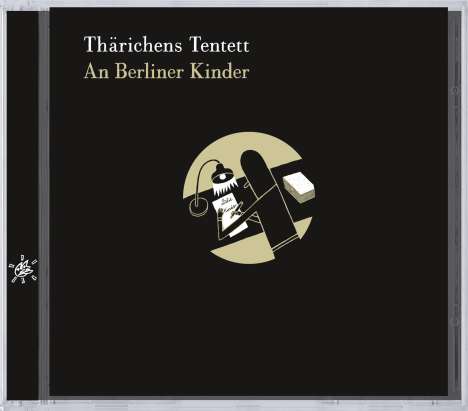Thärichens Tentett: An Berliner Kinder auf CD
An Berliner Kinder
Herkömmliche CD, die mit allen CD-Playern und Computerlaufwerken, aber auch mit den meisten SACD- oder Multiplayern abspielbar ist.
(soweit verfügbar beim Lieferanten)
- Label:
- Double Moon
- Artikelnummer:
- 1286256
- UPC/EAN:
- 0608917111620
- Erscheinungstermin:
- 11.10.2012
Noch niemals war Nicolai Thärichen vorhersehbar oder gar berechenbar. Schon gar nicht, wenn es um seinen Klangkörper Thärichens Tentett geht. Mit dem fünften Album seit Gründung der Formation im Jahre 1999 pfeift er erneut genüsslich auf alle jazzpolizeilichen Anordnungen. Und treibt gar ungeheuerliche Dinge – denen er dann den Stempel 'deutsches Jazzkunstlied' aufdrückt. Deutsche Texte im Jazzgewand? Gab es vereinzelt schon. Aber die schrägen Lautgedichte des Dadaisten Hugo Ball neben boshaften Versen von Joachim Ringelnatz? Dazu Bachs 'Arie der Wollust' und ein Sonett von Shakespeare? Und doch weder Kitsch-Alarm noch Impro-Geschrammel? Wer Thärichen und seine Band kennt, weiß auch, dass das Resultat weit entfernt bleibt von akademischem 'Lyrik und Jazz'. Aber was denn nun? Eine Ode an die Berliner Kinder, eine Verbeugung vor allen Zweiflern an einer ungebrochenen Ästhetik, eine Liebeserklärung an die deutsche Sprache, genussvolle Verätzung derselben, und am Ende die Vereinigung von alldem mit Hilfe genau der Musik, die das auch meistern kann: dem Jazz. Die Kompositionen Thärichens sind maßanzugssauber eingenäht, seine Musiker wissen aber allzu herzige Arrangements mit stürmischen Soli zu konterkarieren; und über alldem: die Stimme Michael Schiefels. Natürlich kennt man ihn als Deutschlands versiertesten und variabelsten Jazz-Sänger. Und doch gelingt es ihm erneut, sich selbst zu übertreffen. Von glockenheller Engelsstimme bis triefend höhnischer Herablassung – da erklingt ein Kosmos.
Product Information
Nicolai Thärichen's playing has never been foreseeable or even predictable. And especially not when it is a question of his band Thärichen's Tentett. With the fifth album since the founding of the group in 1999, he again enjoys mocking all rules of the jazz police. And he engages in outrageous things, which he calls "German jazz art songs". German lyrics in a jazz look? This has already existed in individual cases. But the weird sound poems of the Dadaist Hugo Ball alongside the malicious verses of Joachim Ringelnatz? Added to that, Bach's "Arie der Wollust" ("Aria of Vice") and a sonnet by Shakespeare? But still neither alarm due to trashy goods nor thrashed improvisations? Whoever knows Thärichen and his band also knows that the result remains far removed from academic "lyric and jazz". But what then? An ode to the children of Berlin, a bow to all doubters of undiminished aesthetics, a declaration of love to the German language and gleeful caustic treatment of the same, and the combination of all at the end with help of precisely the music that can master it too: jazz. Thärichen's compositions are custom-tailored to fit in, but his musicians above all know how to counter excessively cute arrangements with stormy solos, particularly the voice of Michael Schiefel. Of course, he is known as Germany's most experienced and variable jazz singer. But he still succeeds again in outdoing himself: from the bell-clear voice of an angel to bristling, mocking condescension – a cosmos of sounds rings out. The CD opens with a song ("Deutsch") that puts his doubts in the forefront: I find it strange when I sing in German – but that is pulverized in the further course of the song. In the next title song "An Berliner Kinder" ("To the Children of Berlin"), Thärichen weaves the sarcastic lyrics of Ringelnatz with a composition, which makes a total art work from the poem. Thärichen also knows how to put the ambience of the lyrics in to music in the other pieces on the CD, regardless of whether they are more of a satirical nature ("Der Schizophrene" [The Schizophrenic"]/Hugo Ball), permeated by deep sadness ("Abschied" [Departure] and "Totenklage" [Lament]/Hugo Ball, "Aus"/Joachim Ringelnatz), or enriched with a twinkle in his eyes ("Genau besehen" [Considered Precisely] and "Ferngruss von Bett zu Bett" [Long-Distance Regards from Bed to Bed]/Ringelnatz as well as "Seepferdchen und Flugfische" [Seahorses and Flying Fish]/Hugo Ball). A German translation of William Shakespeare's sonnet no. 87 takes its place here: a (hopeless) love poem. And a unique version of Bach's aria BWV 213, no. 3, in which it reads "Schmecke die Lust Der lüsternen Brust" ("Taste the delights Of a lascivious breast) (the lyrics were substantially changed in further use of the aria in the "Weihnachtsoratorium" [Christmas Oratorio]). An enormous challenge for Schiefel's voice and Thärichen's arrangement art! Both master the task brilliantly – really a musical gem!
Rezensionen
,,Mit Sänger Michael Schiefel und seinem kraftvoll groovenden Ensemble spürt Thärichen kontrastreich dem Witz des Allzumenschlichen nach." (Audio, November 2012)
,,Die sarkastisch-satirischen Texte fasste er (Thärichen) in vertrackte Kompositionen, gekrönt von einer Bach-Arie (BWV 213), die selbst dem grandiosen Schiefel das Letzte abverlangt. Der meistert's mit Bravour." (Stereo, Januar 2013)
Disk 1 von 1 (CD)
-
1 Deutsch
-
2 An Berliner Kinder
-
3 Aus
-
4 Schlafe, Mein Liebster
-
5 König bei Nacht D
-
6 Der Schizophrene
-
7 Abschied
-
8 Ferngruß von Bett zu Bett D
-
9 Totenklage
-
10 Genau besehen
-
11 An M.
-
12 Seepferdchen und Flugfische
Mehr von Thärichens Tentett




